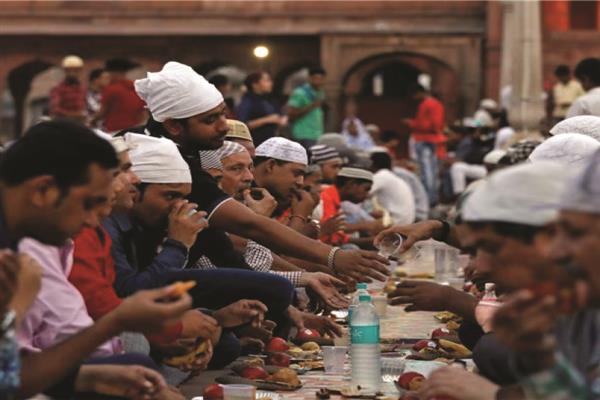Kashmir Magazine By : Kashmir Magazine | Srinagar, Publish Date: Saturday, March 16, 2024 1:41:56 AM | Updated Date : Saturday, March 16, 2024 1:41:56 AM

Dr. Tasaduk Hussain Itoo
Food has a great significance in Islam. It is associated with one’s relationship with Almighty Allah. The physical body is a gift from Almighty Allah; it is given to humans as an amanah (in trust) to take care of for a fixed period. How much food one consumes and the choice of food have a direct impact on the physical and spiritual well-being of the person. It affects one’s behaviour and personality. Generally, wholesome, natural and healthy food assists the development of a good personality.
Overeating has long been avoided in Islam as it is thought to increase worldly appetites and cause sluggishness, thereby ‘dulling’ the soul, hampering spiritual growth and increasing physical ailments. Chapter 20, verse 81 of the Qur’an states, “Eat of the good and wholesome things that We have provided for your sustenance, but indulge in no excess therein.” The blessed Prophet (SAW) said, “The children of Adam fill no vessel worse than their stomach. Sufficient for him is a few morsels to keep his back straight. If he must eat more, then one-third should be for his food, one-third for his drink, and one-third left for air...” (Sunan al-Tirmidhi).
Islam sees health and ‘well-being’ as much more than just bodily health -- well-being or tranquillity requires a strong relationship with one’s spirituality, good physical health, mental happiness, a sense of purpose and good character and relationships. Islam makes a strong connection between food and worship and teaches that all forms of worship have a deeper purpose and impact and contribute in some way to individual and social well-being. In chapter 7, verse 31 the Qur’an is categorical, “Eat and drink freely, but waste not by excess, for He does not like the wasters.”
Islam therefore creates a sense of responsibility in people to take a healthy living lifestyle as normal. Fasting in the month of Ramadan teaches us to manage and practise spirituality and not to eat excessively. The essential part of spirituality in food is that we are grateful and thankful for the food we get. The blessed Prophet Muhammad (SAW) once said, “Allah has a right over you; your body has a right over you…”
To strike a balance between the needs of the physical body and one’s spiritual needs, one must on the one hand consume the right type and amount of food and on the other hand develop excellent interpersonal skills. Fasting in the month of Ramadan is an opportunity to make significant changes in one’s lifestyle and develop the resolve to make healthy living choices.
The diet should be simple and not differ too much from one’s normal everyday diet. It should contain foods from all the major food groups - like fruits and vegetables; bread, other cereals and potatoes; milk and meat; fish and dairy food alternatives; foods containing fat and foods containing sugar.
SUHOOR -- the pre-dawn meal should be a wholesome, moderate meal that is filling and provides enough energy for many hours. It is therefore particularly important to include slowly-digesting foods in the Suhoor. For example, complex carbohydrates are foods that will help release energy slowly during the long hours of fasting. Complex carbohydrates are found in grains and seeds, like barley, wheat, oats, millets, semolina, beans, lentils, wholemeal flour, basmati rice, etc. Fibre-rich foods are also digested slowly and include bran, cereals, whole wheat, grains and seeds, potatoes with the skin, vegetables such as green beans and almost all fruit, including apricots, prunes, figs, etc.
IFTAR -- is the meal which breaks the day’s fast. This meal could include dates, following the Prophetic traditions. Dates will provide a refreshing burst of much-needed energy. Natural fruit juices will also have a similar, revitalising effect. The meal should remain a meal and not become a feast.
Many of the foods which are mentioned and encouraged in the Holy Qur’an and the Sunnah (the Prophetic traditions, SAW) also correspond to modern guidelines on a healthy diet and will help to maintain balanced, healthy meals in Ramadan. The most commonly consumed foods by Prophet Mohammed (peace be upon him) were milk, dates, lamb/mutton and oats. Healthy foods mentioned in the Holy Qur’an are fruit and vegetables, such as olives, onions, cucumber, figs, dates, grapes as well as pulses such as lentils. The encouragement of fish can be seen in the fact that Islamic law spares fish from any specific slaughter requirements, making it easy to incorporate fish in a meal.
Foods to avoid are the heavily-processed, fast-burning foods that contain refined carbohydrates in the form of sugar, white flour, etc., as well as, of course too much fatty food (e.g. fried cakes, biscuits, chocolates and sweets). It may also be worth avoiding the caffeine content in drinks such as tea, coffee and cola. (Caffeine is a diuretic and stimulates faster water loss through urination.)
CONCLUSION
The fasts of Ramadan can improve a person’s health – if the correct diet is followed. To fully benefit from fasting, a person should spare a great deal of thought to the type and quantity of food they will consume through the blessed month. Overeating can not only harm the body, but it also interferes with a person’s spiritual growth during the month. A diet that is sufficiently balanced will keep a person healthy and active during the month of Ramadan.
(The author is a medico, educator & columnist; and can be reaced at: drtasadukitoo@gmail.com)